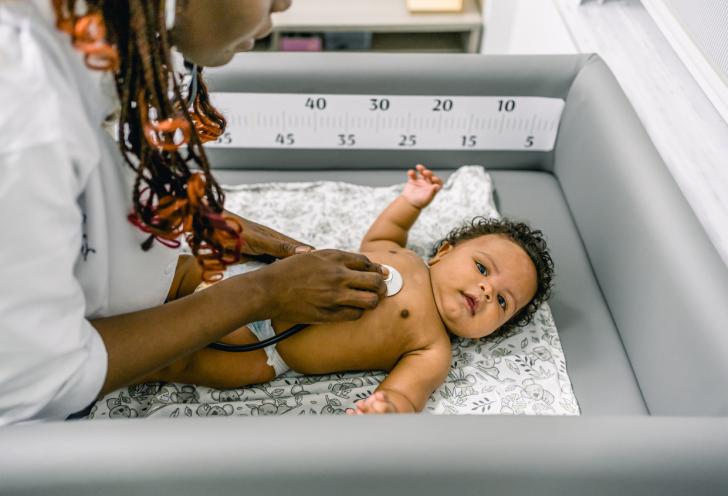Maternal-Child Health Program Overview
Unlock your maternal and child health advocacy, research, and leadership skills and start creating change at the systems level. In order to improve maternal-child health care, much work is needed outside the clinical setting. If you are passionate about eliminating health inequities and transforming perinatal care, this is the degree program for you.
This program is primarily online, meaning you’ll be able to continue living and working in your home community. Students spend two weekends on campus, one at the beginning and one at the end of the program, and attend two synchronous classes virtually most weeks of the term. Students will complete a master’s thesis, capstone project or internship of their choice, in collaboration with an advisory committee.
Maternal-Infant Health Program Highlights
Social Justice Lens
Mostly Online Learning Format
Mentorship by Expert Faculty
Maternal Health Program Expected Outcomes
Upon completion of Basytr’s MA in Maternal-Child Health Systems, students will be prepared to:
- Integrate ethics, human rights, and social justice principles into all aspects of maternal and child health systems
- Evaluate policy issues regarding women's health and maternal-child health within a variety of jurisdictions and organizations
- Demonstrate the ability to develop policies and gain stakeholder support to promote health improvements for women and infants
- Analyze and compare healthcare delivery, regulatory, and finance models to unearth and appreciate facilitators and obstacles to options, access, and positive health outcomes from women and infants
- Develop expertise and share knowledge in a selected area of MCH policy, practice, education, leadership, or research
- Analyze and apply local, national, and international data to:
- Interpret historical and emerging trends related to the variance and determinants of health in women and young children
- Translate expert clinical knowledge and research relevant to midwifery and health care delivery into best practice models
- Implement the most effective components of holistic MCH care
- Develop, implement, and evaluate practice models and delivery systems to improve MCH care while:
- Understanding historical and contemporary components of care
- Engaging community partners to develop programs based on community needs and priorities
- Analyzing and applying theoretical frameworks relevant to the disciplines of midwifery, bioethics, and social justice to inform and evaluate MCH systems
Maternal and Child Health Systems Program Details
Summer
MW6120 Professional Focus A: Power and Privilege (2 credits)
MW6121Professional Focus B: Utilizing Health Data (2 credits)
MW6125 Research Design, Evaluation and Application in MCH Systems (6 credits)
MW6128 Independent Project 1: Ideas and Context Review (1 credit)
Fall
MW6122 Professional Focus C: Programs and Models for MCH Systems (2 credits)
MW6126 Research Design, Evaluation and Application in MCH Systems 2 (3 credits)
MW6129 Independent Project 2: Proposal and IRB Application (3 credits)
MW6133 Maternal-Child Health Systems (4 credits)
Winter
MW6123 Professional Focus D: Integrative Culture and Social Justice in MCH Systems (2 credits)
MW6127 Research Design, Evaluation and Application in MCH Systems 3 (2 credits)
MW6130 Independent Project 3: Implementation (4 credits)
MW6139 Advocacy for MCH Policies and Practices (4 credits)
Spring
MW6124 Professional Focus E: Leadership in Maternal-Child Health (2 credits)
MW6131 Independent Project 4: Finish Implementation, Analysis, Presentation (4 credits)
MW6135 Management Principles for Innovation in MCH Systems (4 credits)
MW6140 Maternal-Child Health Systems in a Global Context (2 credits)
See the tentative schedule for courses each quarter
-
Applicants should have a bachelor’s degree or equivalent number of credits (180 quarter credits) from an accredited university or a MEAC accredited midwifery program with a GPA of 3.0 or higher. Applicants without a bachelor’s degree who have a midwifery certificate or other professional training will be considered on a case-by-case basis.
-
Applicants must also have appropriate training (with appropriate certification when available) and documentation of a minimum of two (2) full-time years of practical experience as a midwife, doula, childbirth educator, or lactation specialist. Other credentialed MCH professionals such as perinatal nurses, public health specialists, social workers, health care financial experts, psychologists, and physicians seeking leadership training consistent with humanistic, rights-based maternal-infant care will also be eligible.
-
Admitted students must have access to a laptop computer with high-speed Internet, a webcam, and a headset.
Course Prerequisites
-
Prerequisite courses (with grades of 3.0 or higher in each course) include:
-
A basic statistics or biostatistics course within the past five years
-
English composition and writing
-
A public speaking course or equivalent academic or professional experience with public speaking, as determined by the University’s admissions process
Bastyr accepts graduate and undergraduate transfer credits earned at accredited colleges and universities. Learn what you need to make this process go smoothly.
For more information on loans and scholarships, visit financial aid.
This fund provides tuition reduction support for midwives in our Master of Arts in Maternal-Child Health Systems program.
Dorothea Lang, CNM, MPH, FACNM, a midwifery leader of national and international prominence who passed away in May 2017 at age 84, believed in a unified profession and the need to expand our capacity by growing the “academy” of educators, researchers and policy experts. Inspired by the launch of this innovative new program in 2015, Dorothea made a significant gift to create scholarships to support talented midwives committed to taking leadership in changing our maternity care system.
Some available job opportunities in maternal health are as follows:
- Education leadership, research, policymaking and advocacy
- Program management and administration
- Research
- Consultant to maternal/infant health initiatives
- Educator in maternal-child health systems
- Local or national policy advocate

Transform Healthcare for Birthing People
At Bastyr, we believe that birthing people and babies deserve the best healthcare.
Access our guide to explore some of the biggest challenges birthing people face today and how midwives and maternal-child health advocates, like those who graduate from Bastyr, can help.












